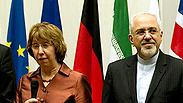
In nuclear talks, UK is not relying on Iran's smiles
Op-ed: 'I know Israelis worry Iran will develop nuclear weapons under our noses. But we are not naïve,' British envoy to Israel Matthew Gould writes.
The first concern is that we would prefer to make a bad deal than no deal at all. This is simply wrong. We know that an Iranian nuclear weapon would be a clear danger not only to Israel but to the region and to the world. We share the same unshakeable goal of preventing Iran from building a nuclear weapon. We remain committed to ensuring that Iran’s nuclear program is exclusively peaceful. The UK and its partners will not settle for just any deal. It will have to be the right deal, one in which the whole world, including Israel, should have confidence.
The second concern is that the November interim agreement leaves Iran close to the threshold, and that the interim agreement will in practice become the final agreement. The interim deal stops Iran making progress in its nuclear program and even pushes back some aspects of it. However, we have no intention of stopping there. Iran has far more to do to address all of the international community’s concerns about its program. Only then can Iran receive relief from the tight grip of sanctions, in particular on oil and the financial sector.
I know Israelis worry that as we embark on these negotiations, Iran will develop nuclear weapons under our noses. But we are not naïve, and, although we urge all sides to negotiate in good faith, we are not relying on good words, smiles or promises. In the interim deal we built a stringent arrangement for verification, with daily inspections of the key sites. Right now, there are an unprecedented number of inspectors on the ground, and any comprehensive deal will have to be based on intensive monitoring over a long period of time. Iran should also be clear about the inevitable consequences of any attempt to cheat: A dramatic strengthening of sanctions.
Next step in our long journey together
I understand finally the concerns that we are lifting the sanctions pressure too fast. People in Israel have been shocked by the rush to Tehran by businesses keen to start trading again. But it is important to separate appearance from reality. The reality is that the vast majority of the sanctions regime is still in place, and still enforced by a strong mesh of US, European and national laws.
The unprecedentedly tough sanctions on financial transactions with Iran are still in place. The oil sanctions remain fully in place, costing Iran up to $8 billion every single month. Those sanctions will remain in place until the right comprehensive agreement is secured. The interim deal is worth an estimated $7 billion and the sanctions relief package we agreed in the interim deal was limited, targeted and reversible. It represents a small proportion of the all the sanctions on Iran. At present, US and EU sanctions mean that Iran cannot access at least $60 billion of assets frozen overseas. We will also continue to prosecute sanctions-busters and not to encourage British companies from trading with Iran until the deal is done.
The Iranian nuclear program is a fundamental concern for Israel. It is a first-order security concern for the British Government also, and an issue into which the UK and Israel have invested over 10 years of close cooperation. Despite our differences, there is still vastly more that we agree on than we disagree on – including our desire for a peaceful and negotiated solution to the Iranian nuclear question. This week’s negotiations are the next step in our long journey together.
Matthew Gould is Britain's ambassador to Israel.










